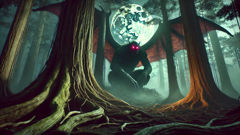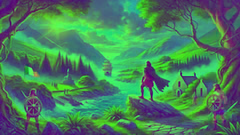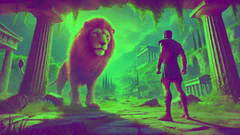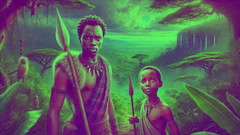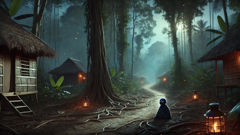Introduction
Before the first rooster crowed and before the rivers cut their winding paths through Ghana’s lush, emerald forests, the Akan people whispered of shadows among the trees. These weren’t the usual shapes cast by twisted branches or darting antelopes. Instead, villagers spoke in hushed, urgent tones about the Sasabonsam—a creature born of night and legend, a terror whose name froze even the most seasoned hunter. Descriptions varied: some claimed it was a giant with legs so long it perched among the tallest silk-cotton trees; others described bat-like wings stretching wider than a canoe is long and eyes glowing red as embers in the dark. But one detail stayed the same: to glimpse the Sasabonsam was to feel fear curl like a snake inside your belly. The Akan forests were a world unto themselves, where the hush of dawn meant safety and the chorus of insects after sunset signaled caution. Here, families gathered around firelight, children nestled into their mothers’ laps, as elders recounted tales that fluttered between myth and memory. It was in this setting—a village cradled at the edge of the forest, surrounded by ferns and ancient trees—that the story of Kwabena, the fearless youth, would unfold. His journey would become a tale not just of monsters, but of the courage woven into the Akan spirit, of a battle fought not with weapons alone but with heart and wisdom. This is the story of what happens when darkness comes alive and when the bravest among us must venture into its depths.
Whispers in the Dark: The Village on Edge
Night in Kwantanan was a living thing. It stretched its arms over thatched roofs and spilled shadows across narrow footpaths, swallowing the laughter and songs that flourished by day. For generations, villagers had learned to respect the darkness—never venturing too far, always returning before the last golden streaks left the sky. Lately, however, even those careful customs could not keep unease at bay. Chickens vanished without a trace, goats were found dead with strange wounds, and children woke screaming of crimson eyes watching them through gaps in the mud walls.

Kwabena, still not yet a man by Akan rites, was old enough to carry his father’s hunting spear but young enough to be drawn to mysteries. His curiosity was both a blessing and a curse; while others shuddered at tales of the Sasabonsam, he burned to know the truth. His grandmother, Maame Efua, was the village’s oldest storyteller, and her words shaped the dreams and nightmares of every child. One evening, as the moon rose and the palaver hut filled with anxious faces, Maame Efua’s voice rose above the embers: “The Sasabonsam is not just a beast—it is a spirit of the forest’s anger. It comes when we forget our respect, when we steal from the trees or hunt more than we need.”
The elders nodded grimly. Chief Akoto, burdened by responsibility and sleeplessness, declared that the time had come to send an offering to appease the creature. The bravest hunters, their faces painted with ash and ochre, would venture into the forest at dawn. But whispers rippled through the crowd—would an offering be enough? Or would the Sasabonsam hunger for more?
Kwabena’s mind churned with questions. That night, while his mother’s gentle lullaby faded into the soft rustle of palm fronds, he resolved to seek answers himself. He spent hours gazing at the forest’s edge, where the moonlight seemed to bend and falter. The shadows moved with a purpose, as if waiting. He thought of his father’s missing goats, of his sister’s tears when nightmares woke her, and he felt a strange mixture of dread and determination. Something had to be done.
The next morning, as dew clung to every leaf and the scent of wood smoke drifted on the breeze, Kwabena slipped away from the village. He carried only a sling, a woven pouch of roasted plantain, and his father’s old talisman—an amulet said to offer protection from evil spirits. The path beneath his feet grew less familiar as he pressed deeper into the trees. Birds called warnings from above, and every snapped twig made his heart pound. Yet he pressed on, driven by a force stronger than fear.
He soon found himself at the base of a giant silk-cotton tree, its roots coiling like snakes around a mound of stones. Here, the air felt thicker, heavy with something unseen. Kwabena knelt and whispered a prayer to Asase Yaa, goddess of the earth, asking for guidance and courage. Suddenly, a low, guttural sound rumbled overhead. He froze, searching the branches. There, high above, he glimpsed a hulking shape—long legs dangling, wings folded tight, eyes burning red through the gloom. The Sasabonsam was real.
A Dance with Shadows: Into the Heart of the Forest
Kwabena’s breath caught in his throat. The Sasabonsam, its form half-shrouded by hanging moss, seemed at once impossibly still and yet poised to strike. For a long moment, neither moved. Then, as if sensing his gaze, the creature shifted. Its enormous wings unfurled with a leathery crackle, and those legendary legs—longer than any man was tall—swung forward, clutching the branch in an uncanny, almost human fashion. The red eyes locked with Kwabena’s own, and in that instant, every story he’d ever heard became real.
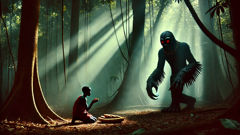
He ducked behind a buttress root, heart hammering. In his mind, Maame Efua’s words echoed: “Show respect, offer peace.” Trembling, Kwabena fumbled for the talisman and pressed it to his chest. He remembered the roasted plantain in his pouch—an offering, humble but honest. Crawling forward, he placed the food at the tree’s base and whispered a plea for mercy. The Sasabonsam dropped from its perch with a weighty thud that shook the earth. Its wings folded close, it towered over Kwabena—a nightmare given flesh. The creature sniffed the air, nostrils flaring, claws flexing in the soft loam.
Instead of attacking, the Sasabonsam tilted its head, regarding the boy with an intelligence that surprised him. It bent low, picking up the plantain delicately in one clawed hand, and sniffed it again. To Kwabena’s astonishment, it let out a low, rumbling laugh—a sound like thunder rolling through hollow logs. The tension in the air shifted, and for a moment, Kwabena sensed curiosity rather than menace.
They regarded each other under the filtered sunlight. Kwabena spoke haltingly, explaining that his people feared the creature but also wished for peace. The Sasabonsam seemed to understand. It pointed a claw toward the heart of the forest, then to its own chest, and finally to the distant village. The gesture was unmistakable—a warning and a question. Would the people respect the balance? Would they stop taking more than they gave?
Suddenly, a chorus of shouts shattered the fragile peace. The hunting party had arrived, spears glinting as they burst through the undergrowth. They saw only a monster threatening their child and attacked without hesitation. The Sasabonsam whirled, wings snapping open with hurricane force, scattering hunters like dry leaves. Kwabena screamed for them to stop, but fear had taken hold. Spears flew, and the creature howled—a sound of ancient rage and pain.
In the chaos, Kwabena darted forward, placing himself between the hunters and the Sasabonsam. He shouted words of truce and respect, repeating his grandmother’s wisdom. The creature paused, bleeding from a shallow wound, and looked into Kwabena’s eyes. It saw something there—courage, maybe, or hope. With a beat of its mighty wings, it soared skyward, vanishing into the canopy as quickly as it had appeared. The hunters stared in awe and fear, unsure if they had narrowly escaped death or destroyed their only chance at peace.
Echoes and Endings: The Forest Remembers
The return to Kwantanan was not a triumphant one. The villagers gathered at the edge of the forest, faces pale with dread and awe. The hunters, shaken and wounded in pride and body, could only stammer out tales of the creature’s wrath and the boy’s strange bravery. Kwabena told his story quietly—how he’d offered peace, how the Sasabonsam had shown restraint when it could have destroyed them all, how violence had almost doomed them.
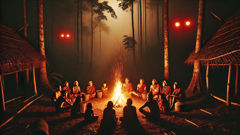
The elders deliberated long into the night. Chief Akoto, humbled by the near disaster, called for a new approach. Offerings would no longer be sent blindly into the forest; instead, the villagers would honor the old ways—taking only what was needed, giving thanks for every tree felled and every animal hunted. Maame Efua’s stories became lessons, not just warnings, and the children learned to listen to the silence between her words.
For weeks, the forest seemed to breathe easier. The missing animals were fewer, and strange tracks appeared less often near the village. Some nights, from the high branches, pairs of red eyes could be seen watching—but no harm came. The people came to understand that the Sasabonsam was not just a monster, but a guardian of balance. The stories changed: now, elders spoke of the creature’s intelligence, its role as keeper of respect between human and nature.
Kwabena grew into a man respected for his wisdom and his willingness to face fear head-on. He became a bridge between his people and the mysterious heart of the forest. Yet he never forgot the weight of those red eyes on his soul, nor the lesson they taught him—that courage isn’t the absence of fear but the resolve to act in spite of it.
Generations later, children still gathered beneath palm-thatched roofs to hear Maame Efua’s stories—tales of bat wings and glowing eyes, of boys who dared speak with monsters, and of forests that remember kindness as keenly as cruelty. And deep among the trees, where mist curled around ancient roots and moonlight danced on silent wings, the Sasabonsam lingered—watchful, patient, a shadow woven into the very soul of Akan land.
Conclusion
The myth of the Sasabonsam endures not just as a tale of terror but as a living lesson in courage and respect. For the Akan people, stories are maps that guide hearts through shadow and uncertainty. Kwabena’s journey reminds us all that facing our deepest fears often leads us to wisdom that violence cannot achieve. In every rustle of leaves and every flicker of firelight, the balance between human and nature is tested and renewed. The Sasabonsam remains—sometimes monstrous, sometimes a guardian—echoing through the forests as both warning and promise. It is said that on certain nights, when the moon is high and the wind is restless, you might glimpse two red eyes among the branches. If you do, remember Kwabena’s courage and offer a prayer of respect. For in these ancient woods, every shadow holds a story, and every story teaches us how to walk bravely between fear and understanding.

